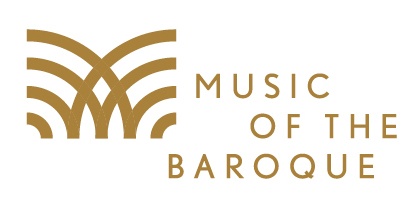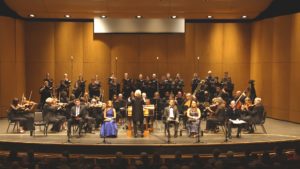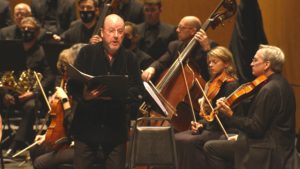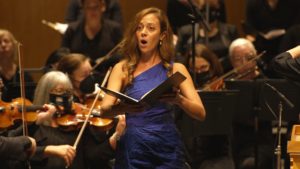
 [rating=3]Sunday night’s concert at the North Shore Center for the Performing Arts by the Music of the Baroque (MOB) was an odd one. Led by maestro and music director Dame Jane Glover, the orchestra, chorus, and five operatic soloists did an excellent job. This was actually a 4-star presentation that received a standing ovation at the end. But technical problems compel me to give this concert only 3 stars.
[rating=3]Sunday night’s concert at the North Shore Center for the Performing Arts by the Music of the Baroque (MOB) was an odd one. Led by maestro and music director Dame Jane Glover, the orchestra, chorus, and five operatic soloists did an excellent job. This was actually a 4-star presentation that received a standing ovation at the end. But technical problems compel me to give this concert only 3 stars.
Handel’s “Jephtha” tells the Biblical tale of the Ancient Israelites and their rebellion against the Ammonites, their rulers for eighteen years. Zebul (a lovingly accomplished performance by bass-baritone Neal Davies) tells the Israelites that unless they rebel, they risk assimilation. He enlists his half-brother Jephtha (the versatile tenor David Portillo) to lead the Israelites in battle in order to free them from Ammonite rule and abandon worship of their gods. Jephtha’s wife Storgè (mezzo-soprano Clara Osowski, who displays a great singing range) is unhappy about the prospect of Jephtha’s going off to war but understands completely. Their daughter Iphis (soprano Lauren Snouffer) is of marriageable age and tells Hamor, her intended (countertenor Aryeh Nussbaum Cohen) that he will gain her father’s respect by fighting for her father. “Alone, Jephtha vows to God that if he is victorious over Israel’s enemies, he will sacrifice the first living thing he sees upon his return.” Unfortunately, the first living thing he sees is his daughter Iphis, who runs to greet him from battle.
The rest of the tale is pretty much that of agony: largely about how Jephtha doesn’t want to kill the daughter he loves and regrets his promise to God but realizes that the deed must be done. In the end, an angel from heaven (soprano Katelyn Lee) descends to earth and says that there is no reason for Jephtha to slay his only daughter (thus echoing the angel that saved Abraham’s son Isaac from slaughter at his father’s hand many years earlier, but I digress). In return for Iphis not being sacrificed, heaven wants her to stay virginal and fulfill God’s purpose (whatever that may be). Despite his great desire to marry Iphis, Hamor obviously has to live with heaven’s ruling and is ultimately happy that she remains alive and well.
“Jephtha” is written in the high baroque style and is not the easiest composition to perform, but Sunday night’s concert was done with flair, talent, and a good sound system. Chorus director Andrew Megill has nicely assembled the lovely voices that make up the Chorus of Israelites, the Chorus of Virgins, the Chorus of Priests, and the generic chorus that are featured in this Handel oratorio. Although the story is relatively straightforward, it is the constant repetition of the lyrics that makes the evening a rather long one because of having to allow enough time for all of the da capo arias with their variations and ornaments as sung by each of the soloists.
Most impressive were the lovely floor-length gowns worn by Snouffer and Lee. Snouffer wears the same shade of blue as the Virgin Mary does in traditional European paintings; the color is meant to be indicative of her virginity. Lee wears the gold-colored gown to indicate her character’s role as an angel from heaven. (Note that the color white would not have worked as well for either character, because white can be associated with being either angelic or virginal.)
But then there were the technical issues….
For starters, the open captioning did not display during the entire first act, that is before intermission. I guess I had become so accustomed to the captioning during the MOB performances that not having this crutch made me somewhat disappointed. After realizing that the captions were not going to come on, I rifled through the pages in my program book to find the libretto. But when I did, the print was relatively small and my reading glasses were still in my handbag. Since I didn’t want to make any unnecessary noise, I figured I wouldn’t use the glasses after all and instead listen to the words and music on their own merits and try to catch the occasional word in the program if I could. But just listening proved to be more difficult than I had originally thought, because the use of the English language in Handel’s time was quite a bit different than today. So even when I quietly opened my handbag and put on my glasses, the room was still on the dark side, so I couldn’t read the libretto comfortably.
Once the second act began, the captioning suddenly worked (though not perfectly), but not before roughly a third or a half of the audience had not returned after intermission. Did they leave because they couldn’t follow the performance or because it was too much effort to read in the dim light? My guest felt that many concertgoers left because the program was a lot longer than expected, even though this was a somewhat abbreviated version of Handel’s original. But there may have been another reason: Some people in the audience might have thought that the intermission was a premature end to the concert. The reason is that Sunday night’s printed program contained an error in more than one spot and indicated that the intermission was to take place between Parts II and III. But instead it was moved up to just before Scene Three in Part II, which was considered to be the midpoint of the performance. Clearly some audience members knew as much, because there was applause at a moment when, according to the program, there should not have been. Then I asked myself, “What would have happened had there been some emergency behind the scenes and the show needed to end early?” In this day and age, audiences may not be fully informed about what exactly is going on, and perhaps that’s why some thought they should leave. That’s my long way of saying that an announcement should have been made at the very beginning of the evening that the timing of the intermission had been changed.
It was interesting to watch Dame Glover neatly and diligently conduct all the musicians. She had placed the lengthy score on top of her harpsichord, which she played from time to time. There was a moment, however, during the first act when it looked as if the score were hanging over the harpsichord’s edge. Suddenly Dame Glover accidentally bumped the score and it fell to the floor. I was so impressed with how quickly she retrieved it and found the precise page, all while conducting, no less!
In short, this was an unforgettable concert for all the right reasons, all the wrong reasons, and all the reasons in between. The joys of live entertainment!
Handel’s “Jephtha” by the Music of the Baroque was performed at the North Shore Center for the Performing Arts, 9501 Skokie Boulevard, in Skokie, on Sunday, September 18th. This was followed on Monday, September 19th by a performance at the Harris Theater, in Millennium Park, 205 W. Randolph Drive, in Chicago. Both concerts began at 7:30 p.m.
For more information about this and future performances of Music of the Baroque, including times, dates, and locations, please go to: https://www.baroque.org/. For information about future ticketing, visit: https://www.baroque.org/tickets/.
https://www.baroque.org/tickets/.
Music of the Baroque is a resident company of the North Shore Center for the Performing Arts. To learn more about the venue, their future offerings, and ticket prices, visit: https://northshorecenter.org/.
To learn more about the Harris Theater, their future offerings, and ticket prices, go to: https://www.harristheaterchicago.org/.
COVID requirements shift on a day-to-day basis. For further information about COVID protocols at the various venues, visit: https://www.baroque.org/2022faq.






More Stories
“Antisemitism in France: Past, Present, and Future”- ( a lecture ) story by Julia W. Rath
“Stardust” Reviewed by Jeffrey Leibham
Finding Paul Lisnek